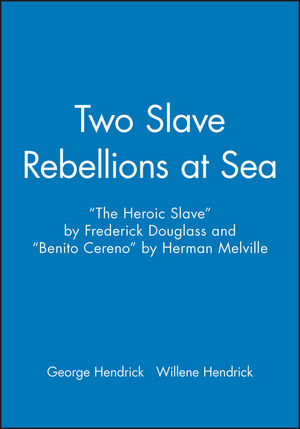|
Textbook
Two Slave Rebellions at Sea: "The Heroic Slave" by Frederick Douglass and "Benito Cereno" by Herman MelvilleISBN: 978-1-881089-45-2
Paperback
160 pages
July 2000, ©2000, Wiley-Blackwell
 This is a Print-on-Demand title. It will be printed specifically to fill your order. Please allow an additional 10-15 days delivery time. The book is not returnable.
|
||||||
Of the mutiny on the Creole, on which Douglass's story is
based, the editors recount what can be recovered about the slave
Madison Washington, who led the revolt, and reconstruct the events
before and after the uprising. The editors warn the readers that
the official documents about the case are all biased against the
mutineers, who were never allowed to tell their story to American
officials. Addressing largely white readers in the North, Douglass,
to the contrary, speaks clearly as an abolitionist: Slaves wanted
their freedom and were justified in using violence to gain
it.
“Benito Cereno" is based on Captain Amasa Delano's chapter in his Narrative of Voyages and Travels... (1817) about a slave mutiny off the coast of South America. Writing in part for a northern readership, Melville tells of a mutiny that, unlike Madison Washington's, was suppressed. Delano's account shows no sympathy for the slaves. Melville's view is hidden in ambiguities. "Benito Cereno" is one of Melville’s stories most often collected in anthologies; Douglas's "The Heroic Slave" is rarely reprinted.



